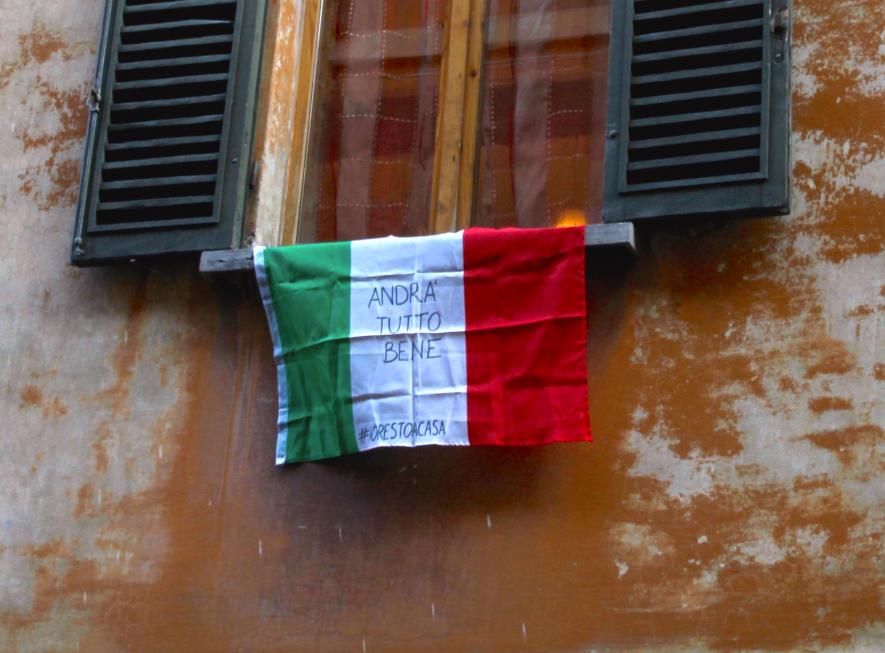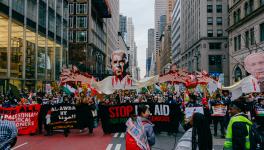Easter Message from a Wounded Land

Image Courtesy: Wikimedia Commons
On Easter Sunday, some four million people heard online the famous Italian singer Andrea Boccelli sing from the magnificent but empty Duomo of Milan, the city from where the Coronavirus spread to Italy. Delivering famous arias, Boccelli’s rich voice has delighted millions and earned him a fortune. But even amidst ecstatic ovations his face expressed a deep pain. He never looked so pained as while he sang in the vast silent cathedral on Easter night.
The Milan Duomo or Cathedral of Milan, draws millions of tourists from the world to marvel at this unique Italian Gothic structure, with its splendid white marble façade and soaring slender spires. Its construction began in 1386, in an Italy that was recovering from the Black Death and undergoing a commercial revolution that would usher in the Renaissance. Various dukes of Milan, notably Ludovico Sforza, added to the structure which was finally completed in 1965. The Duomo has witnessed many dramatic episodes of history.
Leonardo da Vinci, one of the world’s greatest artists, was commissioned by Ludovico Sforza to paint The Last Supper for the Duomo. A few years later a French army invaded Milan, took Sforza to Paris imprisoned in a cage, while Leonardo da Vinci rode next to the invader-king. A century later Milan lost some 60,000 inhabitants to a plague brought on by the negligence of its callous Spanish rulers. Here, after a decisive battle, Napoleon Bonaparte was crowned king of Italy in 1805. The Revolutions of 1848 began here and spread all over Europe, challenging alien rulers and oppressive native ones. Milan was the centre of activities of the Partigianni, the Communist resistance against the occupying Nazi forces who executed Mussolini and hung him upside down in a crowded piazza. Prosperous, fashionable Milan became the hub of industrial activities and tumultuous political activities created by the Christian Democratic and Communist parties.
My parents lived in Rome during the prosperous “Il Boom” years of 1960-1980. With them my sister and I travelled across this magnificent country from Naples to Milan connected by the grand Autostrada del Sole (Highway of the Sun). On visits to Milan we sat in the vast Piazza el Duomo or square fronting the Duomo, along with thousands of other visitors who came to admire Leonardo da Vinci’s masterpiece, drink the aromatic coffee and the light white wines of Lombardy and eat the fluffy millefoglie. Thousands of pigeons added to the sound, colour and movement of the merry scenes. In the evenings we would, along with other tourists, throng the La Scala to hear and attend the famed operas.
Italy has been described as a paradise for exiles. And so it was—until now.
The scene at the Milan Duomo on Easter evening was of tragic desolation. Boccelli sang inside the cathedral which is dark and austere in the best of times. That night it had a scarred haunted look, as if the resurrected souls had come to witness the aftermath of their flight from their ravaged and wounded city. Were they consoled by the music of hope Boccelli sang Since his life is a saga of faith and courage his message—‘have hope’—would be relevant to citizens who are succumbing to despair.
Surprisingly, a sterner message came from an unexpected source. The Pope stands at the centre of the Christian world’s attention when he delivers his Easter sermon from a balcony of the St Peter’s Basilica. We have stood there with the surging crowd, a part of the universal spirit. This year Pope Francis did not stand at the balcony but delivered his Easter message in solitude. While sharing the pain of the world, he advised people not to be self-centred in a world morbidly self-obsessed while pursuing wealth, power and pleasure. The Vicar of Christ admonished powerful Christian nations not to inflict cruel and crushing sanctions on a suffering people—some of whom are not Christians.
Did the Pope hope that amidst disease, death and grief, lockdowns, and the spectre of global recession, the privileged and the powerful of the world would pause in their pursuits to think of the less fortunate fellow beings and share a fragment of their bounty with them?
Boccelli sang of hope to the despairing. Pope Francis delivered a powerful and poignant sermon on responsibility and compassion. This message from a wounded land has touched millions—Hindus like me, others of different creeds. May we abide by his words.
The author is a retired civil servant and writes on international history. The views are personal.
Get the latest reports & analysis with people's perspective on Protests, movements & deep analytical videos, discussions of the current affairs in your Telegram app. Subscribe to NewsClick's Telegram channel & get Real-Time updates on stories, as they get published on our website.
























